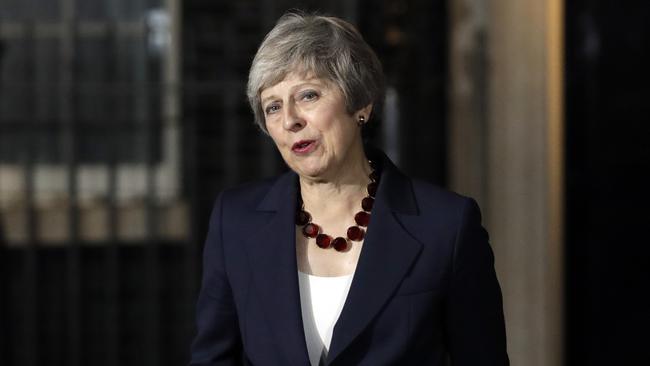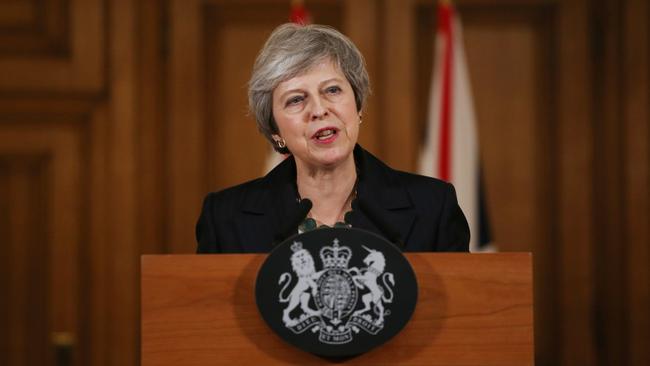
Theresa May has pulled off a miraculous achievement — she has united ardent Brexiteers and devoted Remainers into a single unity ticket. They all hate her deal with the EU, and think it the worst you could possibly imagine, much worse than the membership of the EU that the British people voted in 2016 to repudiate, in the biggest democratic exercise in the nation’s history.
The Prime Minister’s exquisite negative genius here — in producing the very worst possible deal imaginable — may make her both the most incompetent and potentially the most destructive political leader Britain has had, at least since World War II.
The absurdity of what May has agreed to is almost beyond parody. In order, allegedly, to avoid erecting a proper border between the Republic of Ireland, an independent nation, and Northern Ireland, which is part of the United Kingdom, May has agreed that the whole of Britain will stay in the customs union for the time being.
However, there is no time limit for how long Britain is to stay in, and no mechanism by which it can decide to leave the customs union unless the EU agrees.
This is truly insane. It puts Britain in an infinitely worse position than it was in formerly as a member of the EU. At least as a member of the EU it always had the right to leave the EU. Moreover, it had a certain degree of influence as overall the strongest national power in Europe.
The agreement also provides for an even greater degree of alignment between Northern Ireland and EU regulations than the rest of Britain, which gives Northern Ireland an anomalous constitutional status and limits the full sovereignty of Britain in Northern Ireland. Naturally, Northern Ireland’s elected leaders regard this as absolutely unacceptable.
At every level, this is a profoundly undemocratic proposed settlement. It ties Britain even more closely into EU regulation than it was before, after the people voted decisively to leave the EU.
In some respects, this is the triumph of the British establishment, which always opposed Brexit, against the democratic will of voters. It’s a very EU outcome — it doesn’t matter how you vote, or how often, you’ll still have to do as you’re told. Eurocrats rule!
Yet it is in fact worse even than this. May’s negotiation has been so spectacularly incompetent that even much of the establishment that opposed Brexit also opposes her deal.

May says if her deal is rejected, there are only two possible alternatives: either Britain exits with “no deal”, meaning it trades with Europe on the basis of World Trade Organisation rules; or the whole project of Brexit is abandoned and Britain remains a member of the EU after all.
Both Remainers and Leavers would prefer staying in the EU to taking May’s infamous deal.
If Britain stays in the EU after all, it will show contempt for the 2016 vote, but it would still be better than May’s deal.
However, having formally triggered its departure, it’s not clear that Britain could actually stay in the EU.
Brussels, having comprehensively outplayed May, would much prefer her craven deal to a reversion to full British membership of the EU. If Britain stays in the EU, it will remain a powerful advocate against federalist integration and rule by Brussels.
And there will always be the chance that a future British government, with or without a referendum, will leave the EU after all, but this time do it properly.
There is another big advantage for the EU in the permanent netherworld of impotent servitude that May envisages for Britain.
Turkey has a similarly ambivalent status. What that means is that if the EU does a free-trade deal with some other nation or bloc, Turkey is required to abide by those negotiated conditions.
However, the other nation or bloc is not obliged to extend the liberalisation to Turkey that it extends to the rest of the EU.
Therefore, there is the real prospect that the EU in future trade deals could make concessions that specifically and intentionally hurt the British economy but benefit France or Germany, with no reciprocal benefit for Britain at all and no British say in the deal.
An exit with “no deal”, and therefore a reversion to WTO rules, should always have been May’s fallback position. Any deal that one side is not willing to walk away from in any circumstances is extremely one-sided. May, in many speeches and in the Conservative Party manifesto, under various different formulations, always said that “no deal” would be better than a “bad deal”.
But given the depth of British integration with the EU, “no deal” required extensive preparation. It is only five minutes ago that the May government even began such preparation. The EU, seeing her manifest weakness and lack of resolve, now, vilely but understandably, is threatening to make a “no deal” scenario a chaotic disaster.
Thus they say, or imply, they will not recognise British drivers’ licences and even that they will not provide landing slots for British aeroplanes. There is absolutely no reason for this except EU bloody-mindedness and malice.
Given the immense negotiating coin May started with — a $70 billion divorce payment to the EU, the gift of access to the EU’s biggest offshore market, and so much more — that she has brought the nation to this pass is a savage indictment of her.
English politicians tell me the most likely outcome is that the House of Commons will reject May’s deal.
Even the temporary, and doubtless overstated, dislocation of a “no deal” Brexit would be infinitely better for Britain than the long-term decline guaranteed by May’s astonishing capitulation.



